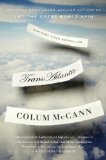Summary | Excerpt | Reading Guide | Reviews | Beyond the Book | Readalikes | Genres & Themes | Author Bio

A Novel
by Colum McCann
KEEPING TO THE prescribed course is a matter of genius and magic. Brown must navigate by any means possible. The Baker navigation machine sits on the floor of the cockpit. The course and distance calculator is clasped to the side of the fuselage. The drift indicator is fitted in under the seat, along with a spirit level to measure bank. The sextant is clipped to the dashboard. There are three compasses, each of which will illuminate in the dark. Sun, moon, cloud, stars. If all else fails, he will have dead reckoning.
Brown kneels on his seat and looks over the edge. He twists and turns, makes calculations using the horizon, the seascape, and the position of the sun. On a notepad he scribbles: Keep her nearer 120 than 140, and as soon as he shoves the note across the tiny cockpit, Alcock adjusts the controls ever so slightly, trims the plane, keeps it at threequarter throttle, keen not to push the engines too hard.
It is so much like handling a horse, the way the plane changes over a long journey, the shift in her weight from the burn-off of petrol, the gallop of her engines, her rein-touch at the controls.
Every half hour or so Brown notices that the Vimy is a little heavier in the nose, and he watches Alcock exert backwards pressure on the yoke to level the plane out.
At all times Alcock's body is in contact with the Vimy: he cannot lift his hands from the controls, not even for a second. He can already feel the pain in his shoulders and the tips of his fingers: not even a third of the way there and it has lodged itself hard in every fiber.
AS A CHILD, Brown went to the racecourse in Manchester to watch the horses. On weekdays, when the jockeys were training, Brown ran on the inside of the Salford track, around and around, widening his circle the older he got, pushing the circumference outwards.
The summer he was seven the Pony Express riders came from America and set up their Wild West show along the Irwell River. His people. From his mother and father's country. Americans. Brown wanted to know who exactly he was.
Cowboys stood in the fields, swirling their lassoes. There were broncos, buffaloes, mules, donkeys, trick ponies, a number of wild elk. He wandered around the huge painted backdrops of prairie fires, dust storms, tumbleweeds, tornadoes. But most amazing of all were the Indians who paraded around the tea shops of Salford in ornate headdresses. Brown trailed behind, looking for their autographs. Charging Thunder was a member of the Blackfoot tribe. His wife, Josephine, was a sharp-shooting cowgirl who wore elaborate leather coats and six-shooter holsters. Towards the end of summer their daughter, Bessie, came down with diphtheria, and when she got out of hospital they moved to Thomas Street in Gorton, right beside Brown's aunt and uncle.
On Sunday afternoons, Brown cycled out to Gorton and tried to stare into the window of the house, hoping to see the shine of the headdress coins. But Charging Thunder had cut his hair short and his wife stood in an apron making Yorkshire pudding on the stove.
A COUPLE OF hours into the flight Brown hears a light snap. He puts on his goggles, leans over the fuselage, watches the small propeller on the wireless generator spin uselessly for a second, shear, then break away. No radio now. No contact with anyone. Soon there will be no heating in their electric suits. But not just this. One snap might lead to another. One piece of metal fatigue and the whole plane might come apart.
Brown can close his eyes and see the chessboard of the plane. He knows the gambits inside out. A thousand little moves that can be made. He likes the idea of himself as a center pawn, slow, methodical, moving forward. There is a form of attack in the calm he maintains.
An hour later there is the chatter of what sounds to Alcock like a Hotchkiss machine gun. He glances at Brown, but he has figured it out already. Brown points out towards the starboard engine where a chunk of exhaust pipe has begun to split and tear. It glows red, then white, then almost translucent. A flock of sparks flare from the engine as a piece of protective metal breaks away. It flies upwards a moment, almost faster than the plane itself, and shoots away into their slipstream.
Excerpted from TransAtlantic by Colum McCann. Copyright © 2013 by Colum McCann. Excerpted by permission of Random House, a division of Random House, Inc. All rights reserved. No part of this excerpt may be reproduced or reprinted without permission in writing from the publisher.
Your guide toexceptional books
BookBrowse seeks out and recommends the best in contemporary fiction and nonfiction—books that not only engage and entertain but also deepen our understanding of ourselves and the world around us.